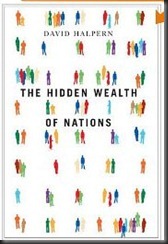 Building on recent books such as Wilkinson and Picket's 'the Spirit Level,' Halpern's latest work builds on the growing intellectual awareness that Greed is not necessarily Good, and that the libertarian core tenet that individualism is not just a divine human right, but an essential element in the further development of humankind, is all nothing but a sham.
Building on recent books such as Wilkinson and Picket's 'the Spirit Level,' Halpern's latest work builds on the growing intellectual awareness that Greed is not necessarily Good, and that the libertarian core tenet that individualism is not just a divine human right, but an essential element in the further development of humankind, is all nothing but a sham.
The re-discovery that we are a social animal and that we have got to where we are today by collective efforts, community building and such old-fashioned [i.e. not financially quantifiable] concepts such as trust and empathy, is going to be a hallmark of this decade's political development and we may even be on the cusp of a general public re-alignment involving the realisation that to be nothing but a stand-alone consumer is not all the neoliberal Right makes it out to be, but we'll see.
Whatever unfolds over the next ten years or so, this book will be I think, seen as a cornerstone in the change of that overall political mood not just in the UK, but in the West as a whole. Richer nations are indeed on the whole 'happier' [whatever that means], but only when that wealth is spread relatively evenly. High levels of wealth- and economic growth- is not enough; a society needs a fair degree of equality and a fundamental current of trust running through that community, for all parts of it to prosper, not just economically but socially and mentally.
David Halpern addresses these issues in his book and gives clear, practical suggestions on how policy can be developed to achieve a more equitable, sustainable society that is more at ease with itself than it is now, after the disaster of more than thirty years of neoliberal Me-ism.
It isn't the book that delivers all of the answers nor is it the one that will be a touchstone that ignites public awareness and precipitates a sea-change [and much needed re-awakening of political possibilities] in our society's approach to life and community, but it is certainly a strong part of the foundations of that growing new awareness and I urge everyone to read it.